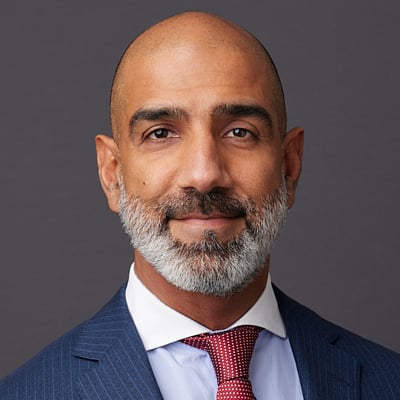Kirkland’s Saudi Strategy: An Inside Look with Partner Kamran Bajwa
Kamran Bajwa participated in a Q&A with Law.com International highlighting the scale and focus of Kirkland’s work in Saudi Arabia.
Kirkland & Ellis entered the Saudi market in 2023, opening a Riyadh office under a regional headquarters license shortly after the Kingdom loosened regulations for foreign legal practices.
Kamran Bajwa, Riyadh partner and founder, leads the firm’s only Middle East office and has built a team of 20 lawyers handling cross-border deals and projects. Key clients include subsidiaries of Saudi Arabia’s Public Investment Fund, which manages over $1 trillion in assets. The team also launched a construction practice that supports the firm globally.
Before rejoining Kirkland in 2011, he spent eight years in Dubai and Cairo, including working as chief legal officer at a MENA investment bank.
In this interview, edited for length and clarity, Bajwa discusses the firm’s work in Saudi Arabia, highlighting the scale and focus of its operations.
Q: How has the legal market in Saudi Arabia changed since you opened your office in October 2023?
A: We came to Saudi Arabia in 2023 because the market introduced major regulatory changes that allowed foreign law firms to establish a direct presence in the country. Since then, we’ve seen more law firms enter the market, increasing competition on the ground.
Q: What has been your strategy in Saudi Arabia? With over 20 law firms now competing there, who do you see as your main competitor?
A: Kirkland & Ellis belongs to a group of global law firms with a defined set of competitors and clients. Among the top 10-15 firms worldwide, we often compete with private equity-focused firms. While competition is healthy, we each find our niche. Sometimes, even if a firm has been in Riyadh longer, clients choose us because of specific deal experience where we excel.
Q: Could you explain what your office is working on at the moment?
A: At Kirkland, our focus is on serving the private equity industry. We see strong alignment between private equity and Middle East sovereign wealth funds, which we also consider a core client group, along with the operating companies they own. Our work centers on [M&A], capital markets, debt, and restructuring, typically representing borrowers rather than banks. In Riyadh, we launched with our core global practices and added a construction practice to meet growing demand.
Q: Are you involved in a project such as NEOM and the Red Sea Project?
A: Our construction team joined us after working at NEOM, particularly during a period of transition across NEOM and Red Sea Global. While those developments were being restructured, we began handling international construction matters from Riyadh. We also began handling international construction matters from Riyadh. Mandates include advising CF Industries on a $4 billion joint venture with JERA and Mitsui & Co. to build the world’s largest low-carbon ammonia plant in Louisiana. That work was led by our construction partner James Clark from Saudi Arabia.
Q: What proportion of your Saudi work is corporate?
A: M&A and corporate practice, representing investors, form about 75% of our work. Other practices support this global investor base.
Q: Does having a regional headquarters also give you the opportunity to work with the Saudi government?
A: We don’t typically handle broader government work, although we have some internal expertise. We work with the Public Investment Fund (PIF) and its portcos and represent government entities acting as investors. PIF subsidiaries require lawyers on the ground in Saudi Arabia to support execution. They’ve also emphasized a preference for teams that work with them both in Riyadh and internationally, rather than only abroad.
Q: How do you attract talent for your Riyadh office? With currently 20 lawyers, are you planning new hires or relocations?
A: Headcount and new hires will depend on market demand. We opened 18 months ago with a strong team to show our full-service readiness, and 20 lawyers is the right size for now. To attract talent, we focus on meeting young lawyers’ career goals. Most won’t stay their entire careers, but we ensure Kirkland offers the best training and progression opportunities.
Q: Are you handling any mandates related to Saudi Arabia’s $600 billion commitment to the U.S.? Do you see progress on that front?
A: We see strong interest from Saudi Arabia and the region in U.S. data centers. Likely, some of the investment will target data centers and digital infrastructure, including AI. While deals are being discussed and clients are showing interest, nothing has been officially announced yet.
Q: Has the ongoing political crisis in the Middle East affected your business in Riyadh?
A: So far, we haven’t seen a direct impact on our work in the Middle East, but the political situation remains a major concern. Clients ask about it, and management monitors the situation closely. While some potential investments may be delayed due to instability, businesses already operating here are accustomed to long-standing regional conflicts and continue to see growth, especially in the UAE and Saudi Arabia.

